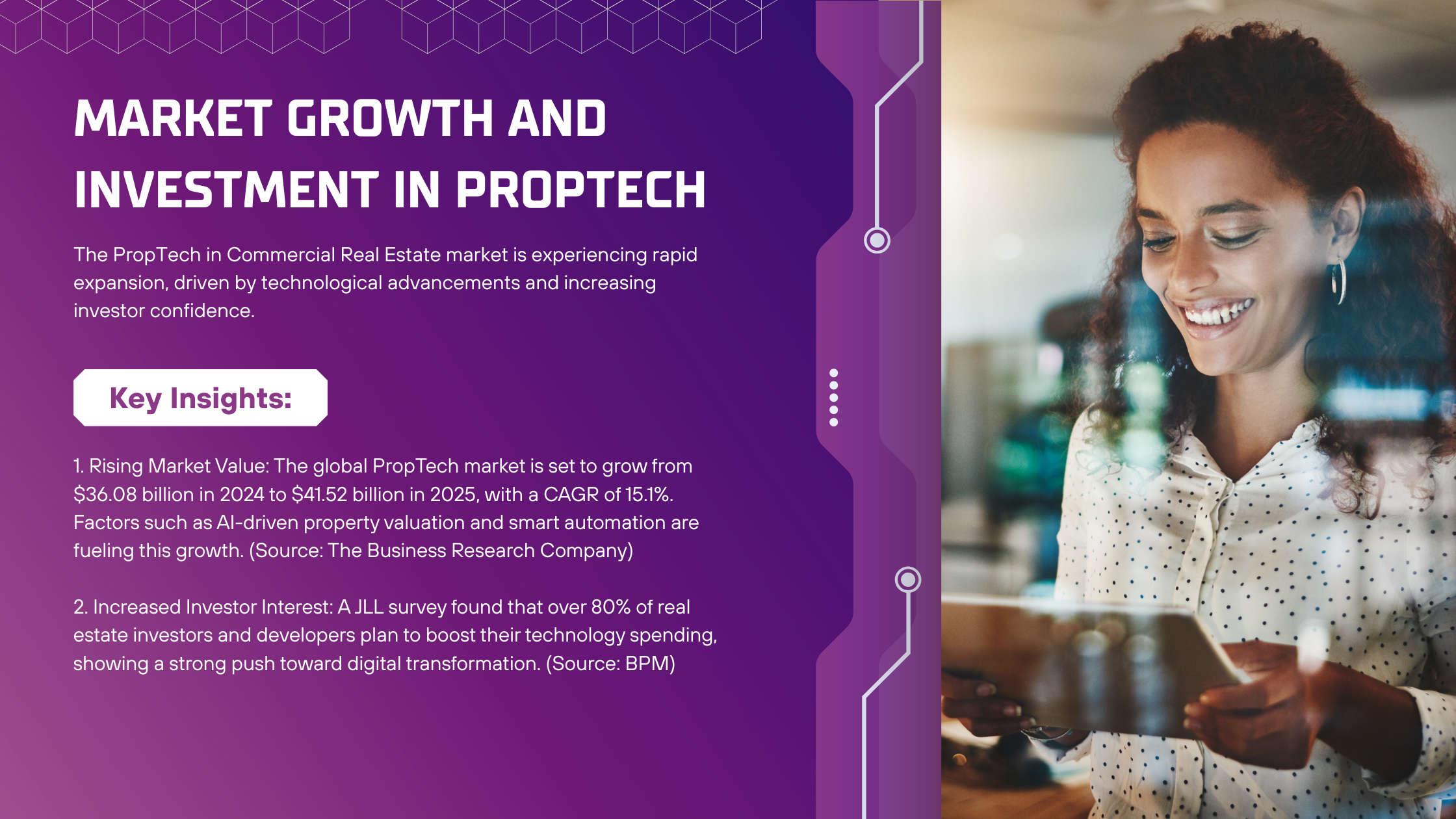The commercial real estate industry has undergone significant transformation over the years, and 2025 is set to be a defining moment with PropTech in Commercial Real Estate reshaping the landscape. From artificial intelligence (AI) and automation to smart building innovations, technology is driving efficiency, reducing costs, and improving tenant experiences. As we step into the future, real estate professionals must adapt to these advancements to stay competitive.
This blog explores how PropTech in Commercial Real Estate is evolving in 2025, highlighting key trends and innovations shaping the industry.
The Rise of PropTech in Commercial Real Estate
PropTech in Commercial Real Estate refers to the integration of technology-driven solutions that enhance property management, leasing, maintenance, and overall operations. In 2025, we see a surge in digital platforms that streamline communication, automate workflows, and provide real-time insights into property performance. Some of the most impactful real estate technology trends in 2025 include:
AI-Powered Analytics for Better Decision-Making
Artificial intelligence (AI) is transforming PropTech in Commercial Real Estate by providing data-driven insights that enhance decision-making. AI algorithms analyze vast amounts of property data, including tenant behavior, market trends, and financial performance, to predict demand, optimize pricing, and improve investment strategies. These insights help property managers maximize profitability while minimizing operational risks.
Digital Lease Management Systems for Seamless Transactions
Traditional lease management involves paperwork, manual tracking, and potential errors. In 2025, real estate technology trends focus on digital lease management systems that automate the entire leasing process. These platforms enable property managers and tenants to generate, sign, and store lease agreements securely online, reducing administrative workload and ensuring transparency in contract management.
Automated Maintenance Scheduling to Enhance Efficiency
Routine property maintenance is critical but often inefficient when handled manually. Automated maintenance scheduling uses AI in Commercial Property Management to detect potential issues, predict service needs, and assign maintenance tasks proactively. Smart sensors in buildings monitor equipment health and trigger service requests automatically, minimizing downtime, reducing repair costs, and ensuring tenant satisfaction.
Virtual Property Tours Powered by Augmented Reality (AR)
With remote leasing becoming more common, Smart Building Solutions now incorporate AR-powered virtual tours. Prospective tenants can explore properties in real-time from anywhere, eliminating the need for physical visits. These immersive experiences provide detailed property insights, enhance marketing strategies, and streamline the leasing process, making commercial real estate transactions more efficient and accessible.

AI in Commercial Property Management
One of the biggest advancements in PropTech in Commercial Real Estate is the adoption of AI in Commercial Property Management. AI-driven tools are transforming the way property managers handle operations by automating repetitive tasks, offering predictive insights, and optimizing resource management.
With rising operational costs, increasing tenant expectations, and the need for data-driven decision-making, AI is becoming an essential tool for commercial property managers. By leveraging machine learning algorithms, real-time analytics, and automation, AI is streamlining property management like never before.
Key Applications of AI in Property Management
1. Predictive Maintenance
Traditionally, property managers relied on reactive maintenance—addressing issues only after they caused disruptions. AI is shifting this approach toward predictive maintenance, where machine learning models analyze data from IoT sensors, building systems, and past maintenance records to detect potential equipment failures before they occur.
How It Works:
AI-powered sensors continuously monitor HVAC systems, elevators, and plumbing for irregularities, detecting even the slightest performance deviations. These sensors collect real-time data, which is then analyzed by machine learning algorithms to predict when a component is likely to fail. By identifying potential issues before they escalate, AI enables proactive repairs, reducing the risk of sudden malfunctions. Property managers receive instant alerts about maintenance needs, allowing them to schedule repairs in advance, minimize downtime, and lower overall maintenance costs. This predictive approach not only enhances operational efficiency but also extends the lifespan of critical building systems.
Benefits:
- Reduces downtime and emergency repairs
- Extends the lifespan of building assets
- Lowers maintenance costs by addressing issues early
2. Tenant Experience Enhancement
Tenant expectations are evolving, and AI is helping commercial property managers meet those demands by providing seamless digital interactions and personalized services.
How AI Enhances Tenant Experience:
AI is significantly enhancing tenant experience by providing seamless digital interactions and personalized services. AI-powered chatbots are available 24/7 to handle inquiries related to rent payments, lease agreements, and maintenance requests, ensuring quick and efficient responses without requiring human intervention. Additionally, virtual assistants automate communication between tenants and property managers, streamlining processes such as service requests and notifications. AI also enables personalized services by analyzing tenant preferences and usage patterns, allowing property managers to offer tailored solutions like customized workspace configurations in office buildings or smart home features in mixed-use properties. This level of automation and personalization not only improves tenant satisfaction but also reduces the workload on property management teams, making operations more efficient.
Benefits:
- Faster and more efficient tenant communication
- Improved satisfaction and retention rates
- Reduced workload for property management teams
3. Energy Optimization
Energy consumption is one of the largest expenses in commercial real estate. AI is transforming energy management by analyzing building usage patterns and external factors to optimize energy efficiency.
How AI Helps in Energy Optimization:
AI is transforming energy optimization in commercial properties by leveraging smart sensors, IoT devices, and predictive analytics to reduce energy waste and lower operational costs. Smart sensors continuously monitor lighting, heating, and cooling systems in real time, ensuring that energy is used efficiently. Automated climate control further enhances energy efficiency by adjusting HVAC settings based on occupancy levels and external weather conditions, creating a comfortable environment while minimizing unnecessary energy consumption. Additionally, AI-driven energy usage predictions analyze historical consumption patterns to identify peak usage times, allowing property managers to implement cost-saving strategies and optimize energy distribution. By integrating these AI-driven solutions, commercial buildings can significantly reduce utility expenses, improve sustainability efforts, and enhance overall operational efficiency.
Benefits:
- Reduces energy waste and utility costs
- Helps buildings meet sustainability and green certification standards
- Enhances occupant comfort by maintaining ideal indoor conditions
4. Market Forecasting & Investment Analysis
AI is playing a crucial role in market forecasting, helping commercial property owners and investors make informed decisions based on real-time data and predictive analytics.
How AI Improves Market Forecasting:
AI is transforming market forecasting in commercial real estate by providing data-driven insights that help property owners and investors make informed decisions. One of its key capabilities is analyzing historical data to identify trends and predict future property values, allowing stakeholders to anticipate market shifts with greater accuracy. Additionally, AI evaluates location and demand by factoring in demographic changes, economic conditions, and rental demand, ensuring that investments align with emerging opportunities. It also plays a crucial role in assessing competitor pricing by comparing rental rates, occupancy levels, and leasing trends across similar properties. By leveraging these insights, commercial real estate professionals can set competitive pricing strategies, reduce investment risks, and maximize profitability in an increasingly dynamic market.
Benefits:
- Reduces investment risks by identifying lucrative opportunities
- Helps property owners set competitive pricing strategies
- Enhances decision-making with real-time market insights
The Role of Smart Building Solutions
Smart Building Solutions have become a cornerstone of PropTech in Commercial Real Estate, making properties more energy-efficient, sustainable, and responsive to tenant needs. With advancements in IoT (Internet of Things) and automation, commercial buildings are evolving into intelligent spaces that adapt to user behavior.
Innovations in Smart Building Solutions:
-
Automated Climate Control: Smart sensors adjust heating and cooling based on occupancy and external conditions.
-
Smart Security Systems: AI-driven surveillance and facial recognition improve property security.
-
IoT-Enabled Devices: Smart lighting, elevators, and access controls enhance building efficiency.
-
Sustainability Initiatives: Green building technologies optimize resource usage, reducing carbon footprints.
By integrating Smart Building Solutions, property owners can significantly improve tenant satisfaction while reducing maintenance and energy costs.
The Future of PropTech in Commercial Real Estate
Looking ahead, the role of PropTech in Commercial Real Estate will continue to expand, with advancements in blockchain for secure transactions, 5G for faster connectivity, and AI-driven property valuation models. Businesses that adopt these technologies will gain a competitive edge, offering enhanced experiences to tenants and investors alike.
Conclusion
PropTech in Commercial Real Estate is revolutionizing how properties are managed, leased, and maintained. With innovations in AI in Commercial Property Management, Smart Building Solutions, and other real estate technology trends in 2025, the industry is moving toward greater efficiency, sustainability, and tenant-centric operations. As technology continues to evolve, commercial real estate professionals must embrace these changes to thrive in the dynamic property market of the future.














